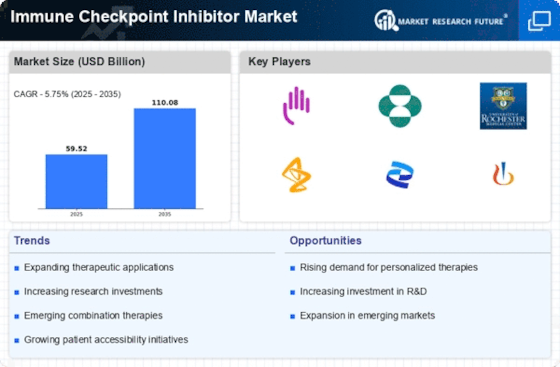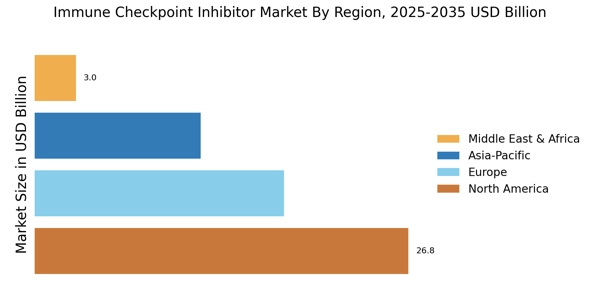Rising Incidence of Cancer
The increasing prevalence of various cancer types is a primary driver for the Immune Checkpoint Inhibitor Market. As cancer cases rise, the demand for innovative treatment options intensifies. According to recent statistics, cancer is projected to affect millions annually, necessitating effective therapies. Immune checkpoint inhibitors, which enhance the body's immune response against tumors, are gaining traction as a viable treatment option. This trend is likely to continue, as healthcare systems seek to address the growing burden of cancer. The Immune Checkpoint Inhibitor Market is thus positioned to expand significantly, driven by the urgent need for effective cancer therapies.
Advancements in Research and Development
Ongoing advancements in research and development are propelling the Immune Checkpoint Inhibitor Market forward. Pharmaceutical companies are investing heavily in R&D to discover novel inhibitors and improve existing therapies. This investment is reflected in the increasing number of clinical trials aimed at evaluating the efficacy of these treatments across various cancer types. The market is witnessing a surge in innovative products, with several new immune checkpoint inhibitors entering the pipeline. This influx of research-driven products is expected to enhance treatment options, thereby stimulating market growth and expanding the Immune Checkpoint Inhibitor Market.
Strategic Collaborations and Partnerships
Strategic collaborations and partnerships among pharmaceutical companies, research institutions, and healthcare providers are fostering innovation within the Immune Checkpoint Inhibitor Market. These alliances facilitate the sharing of resources, knowledge, and technology, accelerating the development of new therapies. Collaborative efforts often lead to the successful completion of clinical trials and the introduction of novel products to the market. As companies join forces to enhance their capabilities, the Immune Checkpoint Inhibitor Market is likely to benefit from a more robust pipeline of innovative treatments, ultimately driving market growth.
Regulatory Support and Fast-Track Approvals
Regulatory support and fast-track approval processes for immune checkpoint inhibitors are crucial drivers of the Immune Checkpoint Inhibitor Market. Regulatory agencies are increasingly recognizing the potential of these therapies to address unmet medical needs in oncology. As a result, there has been a trend towards expedited review processes for promising treatments, allowing them to reach the market more swiftly. This regulatory environment encourages pharmaceutical companies to invest in the development of immune checkpoint inhibitors, thereby enhancing the overall growth and dynamism of the Immune Checkpoint Inhibitor Market.
Growing Awareness and Acceptance of Immunotherapy
The growing awareness and acceptance of immunotherapy among healthcare professionals and patients are significantly influencing the Immune Checkpoint Inhibitor Market. As more information becomes available regarding the benefits and effectiveness of immunotherapy, patients are increasingly opting for these treatments. Educational initiatives and successful case studies are contributing to this trend, leading to a shift in treatment paradigms. The acceptance of immunotherapy as a standard treatment option for various cancers is likely to drive demand for immune checkpoint inhibitors, further solidifying their role in the Immune Checkpoint Inhibitor Market.

















